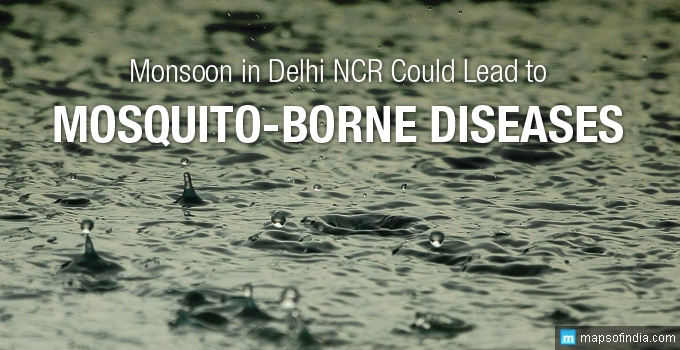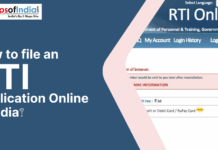The Meteorological Department of Delhi has forecasted spell of rains accompanied with thunderstorms in the capital of the country. The clouds have covered all parts of Delhi and it is raining every other day in Delhi NCR including parts of Rajasthan, Haryana, Himachal Pradesh, UP and Uttarakhand. The monsoon showers are so strong that the capital is partially submerged in the water because of clogging in several areas.
Monsoon and diseases
While the scorching heat rays of the summers make Delhiites wait eagerly for the monsoons, there is no denying the fact that with monsoons there is the sudden spurt of diseases. Early morning showers in the last few days have already led to water-logging in several parts of Delhi, Noida, and Gurgaon, which is one reason for the spread of such diseases. This after effect of monsoon rain is nothing new in Delhi and NCR. Every year, the capital city pays a heavy price for robust monsoon. Monsoon is associated with the perennial causes of viral fever, malaria, typhoid, dengue, chikungunya, food poisoning, dehydration, jaundice and so on. The season for vector-borne diseases usually begins from mid-July and lasts till November end.
Also Read This: Dengue and Chikungunya Outbreak: Cause, Symptoms & Prevention
Food poisoning: Causes, symptoms and prevention
Jaundice – Causes, Symptoms, and Prevention
In 2015, Delhi saw a staggering 15,867 dengue cases. This was the highest number in 20 years. The disease claimed 60 lives that year. In 2016, Municipal Corporations of Delhi (MCD) recorded 17 malaria deaths and dengue claimed 10 lives. In 2016, Delhi saw a chikungunya outbreak which affected 7,760 persons, but thankfully no deaths were reported.
Who are affected the most?
- People with prolonged illness, children and elderly people are likely to get more affected in this period.
- People with low immunity power or asthmatic patients are more prone to diseases in the monsoon season.
- Even the young healthy adults can suffer from monsoon disease if precautions are not taken.
- Usually, the symptoms of monsoon diseases are mostly fever, cold, cough, headache, throat infection and stomach infection.
- If any these symptoms are noticed, then there is the urgent need for consulting the doctor immediately.
Read This: How to Stay Healthy During Monsoons? Do’s and Don’ts
Latest MCD reports
- According to the latest report for the week ending on July 1, 2017, as released by the MCD, a total of 153 cases of chikungunya have already been reported by Delhi hospitals since January.
- 12 cases of chikungunya were recorded last month alone.
- There were 99 cases of dengue since January.
- The number of malaria cases has also gone up, with 125 cases being reported since January.
The “Monsoon season” has only just begun. How prepared are we?
Experts have pointed out that while the pre-monsoon period has already witnessed the outbreak of diseases as per the latest MCD report, there will be more cases of such diseases once we have a clear weather. Post rains, the weather becomes more favorable for mosquito breeding. With the outbreak of monsoons, the concerned authorities are now gearing up to reduce or prevent the outbreak of diseases.
- Aam Aadmi Party’s MCD election manifesto was to make Delhi a vector-borne disease-free zone. With AAP’s health minister Satyendra Jain under CBI scanner, Delhi chief minister Arvind Kejriwal has himself taken on the responsibilities of conducting important meetings and working towards a cleaner Delhi.
- In June this year, Chief Minister Arvind Kejriwal had directed the concerned officials to come up with a comprehensive plan.
- Meanwhile, the civic bodies have claimed that they are keeping watch on mosquito breeding grounds in various locations of Delhi NCR.
- The Delhi government had issued instructions to Delhi hospitals and nursing homes, both government and private, to increase their bed capacity by up to 20% to deal with any possible outbreak of dengue or chikungunya.
- Kejriwal had also requested Union Health Minister J. P. Nadda to reserve 10% beds in Central government hospitals for dengue and chikungunya patients.
- He had also chaired an important meeting of officers from the 3 municipal corporations and the Delhi government to discuss how the capital city would combat and try to get rid of vector-borne diseases.
- All three MCDs have claimed that they have stepped up awareness drives about the do’s and don’ts for the prevention of monsoon diseases.
- Also, the government has banned the sale of non-steroidal anti-inflammatory drugs such as aspirin and brufen over the counter as these can harm dengue and chikungunya patients.
To sum up
One can enjoy the monsoons if proper precautions are taken. While the government and MCD are taking their precautionary measures, we as civilians should also play our part in the prevention of diseases. Experts are of opinion that the best way to remain safe is by staying hydrated and drinking boiled water. And we need to keep ourselves covered by wearing long and full-sleeves clothes. We should especially keep our lower limbs covered as mosquitoes generally bite the lower part of the body. Sleeping under mosquito nets is a wise precaution. Last but not the least, we should keep our surroundings neat and clean.
Read This: Some Refreshing Traditional Indian Drinks To Beat Summer Heat






